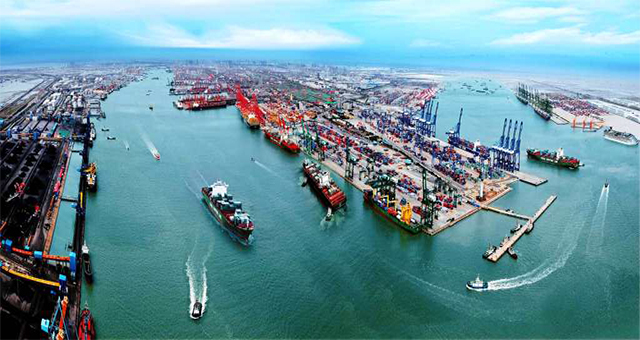
China's new energy vehicle sales double in October
Sales of new energy vehicles in China more than doubled in October, while overall auto sales grew steadily, data from the China Association of Automobile Manufacturers (CAAM) showed Friday. Some 92,000 new energy vehicles were produced in October, up 85.9 percent year on year, and 91,000 were sold, up 106.7 percent from October 2016, according to CAAM. Total auto sales remained stable, with some 2.7 million vehicles sold last month, up 2 percent year on year. But growth slowed from the 5.7 percent growth in September. Meanwhile, a total of 2.6 million auto vehicles were produced in October, up 0.7 percent from the same period last year. However, on a month-on-month basis, auto sales dropped 0.2 percent, while auto production was down 2.5 percent in October. In the first ten months of the year, auto output and sales increased by 4.3 percent and 4.1 percent year-on-year to 22.96 million and 22.93 million, respectively. The robust growth came as China has intensified efforts to encourage the use of new energy vehicles to ease pressure on the environment, by offering tax exemptions and discounts for car purchases, and ordering government organizations to buy more new energy cars. In the latest move, Chinese banking authorities announced new loan policies to allow buyers of new-energy vehicles to borrow a larger portion of the purchase price. Starting in 2018, NEV buyers can borrow up to 85 percent of the cost from banks, up from the previous 80 percent.
A world-level ports cluster in Tianjin FTZ will be formed by 2020
Ports in the capital's neighboring Tianjin and Hebei province will accelerate the pace of their integrated development in maritime transport, a move to support the coordinated development of the Beijing-Tianjin-Hebei region. There are four major ports in the region-Tianjin Port, and Hebei's ports of Qinhuangdao, Tangshan and Huanghua-all of which are located along northern China's Bohai Sea Rim, according to the China Ports& Harbors Association. "The ports have complementary advantages, based on which we should share resources and information to achieve joint development," said Liu Guanghai, general manager of Hebei Port Group Co Ltd, which owns Qinghuangdao Port and several other wharves in Tangshan, Cangzhou and Handan. He said the coordinated development will save costs, improve efficiency and ease competition among all the ports. Liu made the remarks on last Wednesday while discussing a four-year plan on the coordinated development of ports in the region, which was issued by the Ministry of Transport last month. According to the plan, a world-level ports cluster in the region will be basically formed by 2020, with Tianjin Port being the center and ports in Hebei as its wings, the plan said. Tianjin Port, the largest comprehensive port in northern China, will focus on transportation services for containers, roll-on/roll-off automobiles and cruise liners, while ports in Hebei will mainly develop bulk cargo business. The clear division of functions can help avoid homogeneous competition among the ports and ensure all of them with vigorous development, Liu said. Based on the divided functions, other related industrial development will be encouraged, according to the plan. Tianjin Port can develop logistics for automobiles and coldchain deliveries, as well as modern shipping services such as financing and insurance. For ports in Hebei, coal-washing, coal-blending, and ore-screening services can be added. Hebei Port Group, which is headquartered in Tangshan, handled 325 million metric tons of cargoes last year, being the world's largest ports operator for major dry bulk cargoes, according to the group. By the end of 2020, the number is aimed to exceed 540 million tons.
China's online shopping boom heard around the world
Saturday's 24-hour online shopping binge is the day-to-day online shopping market in microcosm, and benefits manufacturers, traders and consumers far beyond China's borders. November 11, China's Singles' Day, became an online shopping spree in 2009 when Alibaba's Tmall began to make it so through extensive promotions. The world's biggest online shopping spree is a barometer of consumer behavior. Set in both "the world's factory" and second largest economy, the event draws shoppers from around the world looking for bargains and multinational corporations seeking sales. "It is a worldwide social synergy event," said Zhang Yong, chief executive officer of Alibaba. "The synergy means joint efforts by global businesses and driven by technology and big data. It is a Chinese phenomenon with world influence." This year, sales hit 100 billion yuan (15 billion U.S. dollars) by 9:04 a.m. Sales on Tmall broke the 10 billion yuan mark just three minutes after midnight. Last year, it took almost seven minutes. "Singles' Day brings us many nice surprises each year, with the new commercial phenomenon and business forces. I think this year will be no exception," said Zhang. Alibaba has created Haitao to help people in China buy foreign products, and TMall Global as a marketplace for foreign businesses to sell directly to Chinese consumers. Japanese brands Onward Crosset and Laox, for example, have Singles' Day promotions at their shops on Tmall Global. Stadium Goods, a New York City-based marketplace that sells footwear and other apparel, said it began preparations for the promotion one month in advance. Its Singles' Day sales target is 2 million U.S. dollars, said John McPheters, founder of the company. But it's not just sellers, many foreigners are also buying, according to Cyol.com. According to data by AliExpress, Russia, Brazil, the United States, Spain, France, Ukraine, Israel, Belarus, Canada and the Netherlands have become the top 10 buyers in terms of purchasing power. Females and people from 25 to 34 years old are the main source of the 100 million foreign online shoppers, the data showed. "It is a Chinese phenomenon, but resonates across the world," Zhang said. Alibaba's net income rose 146 percent to more than 17.4 billion yuan year-on-year for the fiscal quarter ending September. Revenue from international businesses reached 2.9 billion yuan, 115-percent growth year on year, thanks to strong growth in its Southeast Asian platform Lazada and China outbound platform AliExpress. "Singles' Day is adding more and more overseas businesses, and it has become a huge opportunity for goods, capital and culture to be exchanged around the world," said Jin Xuejun, professor of economics at Zhejiang University. In 2016, Alibaba's Singles' Day sales totalled 120 billion yuan thanks to its internationalization tendency, but the record was surpassed in just 13 hours this year. The Singles' Day shopping is becoming bigger in scale given JD.com Inc., Kaola.com and other cross-border e-commerce platforms have came to share the big on-line shopping cake. It takes JD.com as long as 11 days to top 100 billion yuan of sales by Nov. 11, in contrast with Alibaba's nine hours. These cross-border e-commerce platforms have made increased efforts to expand businesses abroad. Taking Alibaba as an example, its online payment app Alipay can now support 27 clearing currencies and serve users in over 200 countries. Cainiao Network, the logistics arm of Alibaba, has established 266 cross-border warehouses in 224 countries and regions. Despite convenience and jobs brought by booming e-commerce business worldwide, experts warned of nuisances and risks looming over the whole sector, such as junk information, credit default and internet fraud.
China’s flourishing entrepreneurship boost co-working space industry
With the world’s largest population, China has always struggled when it comes to space, from space for rice growing to space for building rockets. This has made the co-working space industry popular across China, a nation that sees about 15,000 new companies sprout every day. In response, the industry is growing at an annual rate of 30 percent and by 2030 some 30 percent of the working spaces in China will be shared. In two years, co-working space is estimated to reach 51 million square meters in China, Qu Xianyang, a vice-chairman at the China Real Estate Chamber of Commerce who oversees the industry, predicted at a forum on November 3 in Shenzhen, Guangdong. Qu added China’s co-working space industry will embrace its peak in five years, China Business Journal reported. Data from the Ministry of Science and Technology shows that China recorded a total of 7,953 co-working space companies and incubators between 1987 and 2016, topping the world in terms of numbers, amid consistent government encouragement for innovative entrepreneurship. The trend is popular not only in major cities like Beijing, Shanghai, and Shenzhen, but equally popular in smaller cities. The city government of Huizhou – which neighbors Shenzhen – vows to set up 36 city-level co-working space companies by 2020, together with 36 incubators to support high-tech startups in the city. The authorities even pledged up to 1 million yuan as compensation to reboot failed investment in such projects, according to Nandu Daily. The heating Chinese market naturally attracts international players as well. For example, WeWork, the US-based pioneer in co-working space industry, has marveled at the growth of the industry in China. Merely 16 months after it entered the Chinese market, a total of 13 locations have been set up or planned. Eleven months since opening its first location, it welcomed the first company with more than 1,000 employees, while WeWork locations in the US had to wait five years for its first “big client.” Many WeWork locations in China are also reported to fill up in less than a month after opening. The Wangjing location in Beijing saw 1,500 company registrations on the first day of its opening, setting a record in the WeWork global community in 18 countries and regions. The high occupancy and expansion speed comes under the powerful development momentum of companies, including foreign ones seeking their way into China. The world’s most awarded and biggest digital production company, MediaMonks, opened its first branch in China last year with a team of six people at a WeWork location Shanghai as the first step of the company’s exploration in China, according to a spokesperson from the Shanghai branch. Internet electric car company XPeng Motors, with 150 employees, is readying itself for a bigger team of up to 500 employees and a bigger working space of about 2,500 square meters to further work on its self-driving technology that has already accomplished autonomous parallel parking, revealed Zhang Jinjin, a vice president of the company. “We have already established an R&D center in Silicon Valley. We naturally want to enter the global market. We have strong willingness and a clear blueprint to achieve our goal,” Zhang told People’s Daily Online. Alan Ai, WeWork Greater China General Manager, told People’s Daily Online that more locations will soon be open in China, such as in Shenzhen, Guangzhou and Chengdu where economy and urbanization develop rapidly with flourishing company activities. “This is an opportune time to launch the next phase of WeWork China. We will continue to provide a global platform for more China creators to grow, innovate and go global via our new products, services, experiences and the power of our community worldwide,” said Christian Lee, WeWork Asia Managing Director, adding that more efforts would be made to further humanize the way people live and work and connect more people in real life.
China widens access to financial markets for foreign investors
China Friday announced specific measures to ease or lift investment restrictions on foreign companies in its financial markets. Foreign businesses will be allowed to own as much as 51 percent of shares in a joint venture in securities, funds and futures industries, Vice Finance Minister Zhu Guangyao said at a press conference. The cap will eventually be phased out in three years. Current foreign ownership restrictions in Chinese banks and financial asset management companies will also be removed, Zhu said while elaborating on consensus reached by state leaders of China and the United Statesduring a meeting Thursday.
Li seeking new ideas to give the economy boost
China will redouble its efforts to improve the quality of its products and services-as well as its capacity for innovation-to ensure healthy, stable economic growth in the coming year, Premier Li Keqiang said. Li made the remark at a State Council seminar that was attended by economists and business representatives at the Zhongnanhai compound in Beijing. The seminar aimed to analyze China's current development and seek policy recommendations on the country's economic strategy for the coming year. The country's economy grew more than expected in the past year, which has provided a powerful response to those who predicted a hard landing, Li said. "In the past, we have spared no effort to encourage investment," he said. "Now we need more ideas and actions to boost consumption so the economy will grow in a healthier and more sustainable manner." China's economy grew at an annual rate of 6.9 percent in the first three quarters of this year. Final consumption accounted for 4.4 percentage points (64.5 percent) of that growth, with the rest coming from investment and net exports, according to the National Bureau of Statistics. Urging the government to fully implement the strategies approved during the 19th National Congress of the Communist Party of China, Li said the economic work plan for 2018 will be connected with the goal of building a moderately prosperous society in all respects. "As China is now deeply integrated into the world economy, we need to stay aware of various potential risks from outside," Li said, adding that structural contradictions in the Chinese economy still exist. He said the biggest potential for China's future growth lies in the country's rich human resources. "Recent years have seen amazing potential unleashed from the people, with the government streamlining administration and encouraging mass innovation and entrepreneurship," Li said. "We will stand firmly with these efforts to help people to unleash their creativity and create value." The government will continue to cut taxes for businesses to give full play to the role of the market and encourage mass entrepreneurship, he said. In the first nine months, high-tech manufacturing represented 13.1 percent of the year-on-year growth. Among the representatives who spoke with the premier at the seminar was Bai Chongen, deputy executive dean of the School of Economics and Management at Tsinghua University. Bai, a former member of the People's Bank of China monetary policy committee, said it was "encouraging to see that the government has been moderating its annual growth target" over the past several years. "This means we are giving increasing attention to fixing the economic structure in the long term," he said.

Please leave us a message and we will get back to you shortly.

If you want to learn more information about investing in China, please leave your email address, we will send you the relevant information and article every month.
 0086-10-53270173
0086-10-53270173 china@tanikawa.com
china@tanikawa.com











